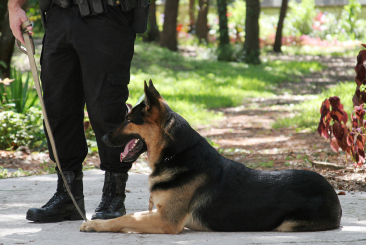|
|
| Important Role of Service Dogs in Corrections |
| By Terry Campbell, Professor, Purdue University Global |
| Published: 11/11/2013 |
 Within correction departments, dog programs consisting of search dogs can have several functions including tracking escaped inmates, assisting law enforcement and agencies in search operations for missing people and others, security, drug searches, and public assistance. No matter the function, the kennel program must be a priority to the correctional agency, as the use of tracking dogs in the correctional setting is a security tool that provides an additional safety network.
Within correction departments, dog programs consisting of search dogs can have several functions including tracking escaped inmates, assisting law enforcement and agencies in search operations for missing people and others, security, drug searches, and public assistance. No matter the function, the kennel program must be a priority to the correctional agency, as the use of tracking dogs in the correctional setting is a security tool that provides an additional safety network.Most correctional settings will see great a benefit to having a kennel but in my experience, complete dedication is needed for success. When made a priority, the service can be applied successfully to a wide range of scenarios. For example, earlier this month, a pair of state prison agency tracking dogs were credited with finding a West Texas man who fled the scene of a traffic wreck that left five people dead. Prior to becoming an educator at Kaplan University, my experience over 25 years in law enforcement and corrections pertains to the use of tracking dogs for escapes from prisons and jails, law enforcement assistance requests with custody escapes, search for missing persons and security. As a warden with kennels located on prison grounds, I served as tactical team leader and worked closely with the kennel supervisor. During my tenure, the State of Arkansas had kennels located at various prisons throughout the state. The kennel and dog handlers– who were inmates carefully chosen for the role– were located and housed in a separate building on the prison grounds. Under the supervision of the kennel supervisor (a lieutenant), inmates worked daily with the dogs and were involved in training and care for the dogs and even horses. Typical daily duties and equipment familiarization required to operate such a program include:
Corrections.com author, Terry Campbell, is a criminal justice professor at Kaplan University, School of Public Safety and has more than 20 years of experience in corrections and policing. He has served in various roles, including prison warden and parole administrator, for the Arkansas Department of Corrections. Terry may be reached at criminaljustice@kaplan.edu . Other articles by Campbell |
Comments:
Login to let us know what you think
MARKETPLACE search vendors | advanced search

IN CASE YOU MISSED IT
|


The title of your article holds much broader meaning in other corrections systems. For example, in Washington State, dogs are trained by inmates as service animals for people in the community with disabilities. Dogs live in the cells with inmates and are trained to do things such as turn lights on and off, open and close doors, etc. In addition to this valuable contribution to the community, the programs serve as an incentive for violence reduction in medium security prisons. They also provide inmates with a sense of self-worth and accomplishment.